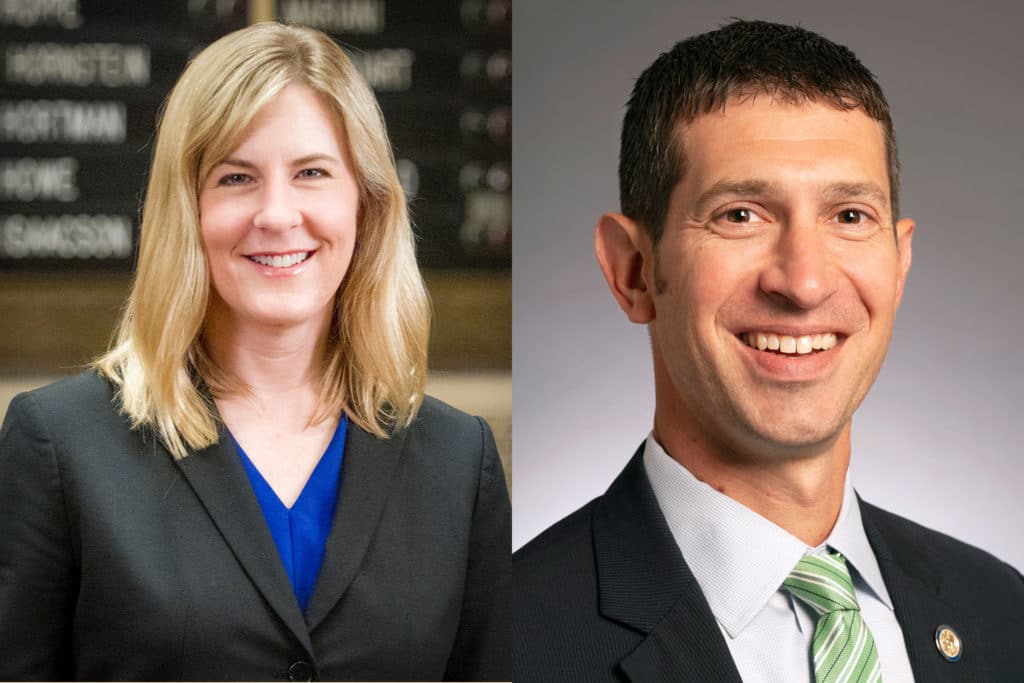Local businesses are scraping by as they deal with the pandemic and inflation. Now they’re facing tax hikes because GOP leaders say Minnesota House Democrats refuse to find an agreement to replenish the unemployment insurance (UI) trust fund.
Across Minnesota, thousands of employers, including YogaFit Studios owner Ashok Dhariwal, are feeling the economic pressure.
“All of our costs are going up in terms of rent, payroll, inflation, utilities. All that has gone up way faster than any of our sales have increased,” Dhariwal told Alpha News.
Dhariwal’s lost about 30 yoga instructors and 70% of gym members within the past two years due to mandated shutdowns by the government. On top of that, pandemic-era grant and loan programs ran out last year.
According to the Department of Employment and Economic Development (DEED), through the end of September 2021 there were about 1.3 million applications for special federal programs. That’s compared to roughly 200,000 applicants in 2019.
Now, employers are preparing to take on the burden of paying higher taxes for something that’s no fault of their own — unemployment.

“We were under the impression, many small businesses, that unemployment was not going to be affected in terms of anything we had to pay out because we could not control our unemployment,” Dhariwal explained.
DFL holding businesses hostage
Minnesota’s UI trust fund was depleted quickly in 2020 due to statewide lockdowns ordered by the government. The state borrowed $1.3 billion from the federal government to keep the unemployment insurance program afloat during the pandemic. The state is also required to have about $1.4 billion in reserves. This means Minnesota is $2.7 billion in the hole.
Businesses will be stuck with higher taxes to replenish the trust fund if the Legislature fails to act soon.
To avoid a tax increase, the Minnesota Senate with the support of Gov. Tim Walz passed a bill to pay off the $2.7 billion. However, GOP leaders say House Democrats have become a roadblock.
The Minnesota House won’t pass the unemployment replenishment bill unless Republicans agree to $1 billion in hero pay for frontline workers. The GOP had already agreed to a $250 million frontline worker package last year, but House Democrats are asking for an additional $700 million.
“It’s very important for us, in light of the surplus that allows us to even contemplate putting money into the unemployment insurance trust fund, that we do more for workers and they (Republicans) so far have not signaled any willingness to do more for workers than the agreement that they made last year,” said House Speaker Melissa Hortman.

Republicans say UI is a separate issue and businesses have a tight deadline of April 30 to pay those new state taxes. If payments are filed late, employers could face state and federal penalties.
In an email to Alpha News, House Minority Leader Kurt Daudt said:
“House Democrats forced a massive tax increase on our employers at a time when Minnesotans are already struggling with inflation at forty-year highs, surging gas prices, and unaffordable energy bills. Government is sitting on more than $10 billion, and there’s more than enough money to stop this harmful tax hike. We just need House Democrats to stop standing in the way, stop holding employers hostage, and put this bipartisan bill up for a vote.”
During a press conference last week, Senate Majority Leader Jeremy Miller promised to pass hero pay if the House agrees to last year’s deal.
“The agreement made last year, we’re ready to do that as soon as the Minnesota House of Representatives passes the $2.7 billion unemployment trust fund replenishment bill. As soon as that’s done, we’re ready to honor the agreement,” Miller said.
Employers demand Minnesota Legislature take action
Local businesses told Alpha News they’re frustrated at House lawmakers for using the UI replenishment bill as leverage. Many employers have already been notified to pay their new state taxes.
“It affects us to be able to increase our payroll, namely give raises. It affects us to not be able to market, which is the biggest thing for us. We can’t advertise as much if we have to pay expenses such as the unemployment insurance fund,” said Dhariwal.
“I think they need to replenish it,” said Don Kavanaugh, owner of DentKraft. “They’re the ones that put us here. I really firmly believe in that and it’s just a really sad thing how we’re all affected by that.”

John Reynolds, the state director of National Federation of Independent Business, said thousands of businesses are looking at a tax increase in the tens of thousands of dollars range per year.
“The state agency that runs the unemployment insurance program says bills on average will be about 30% higher and those higher taxes will persist for years,” Reynolds explained. “We’ll be paying this $2.7 billion debt probably for the rest of this decade, if not longer.”
Industries that will see some of the highest tax increases include seasonal jobs. D&G Excavating specializes in general and commercial excavation, site work, and the supply and delivery of aggregate material. Crews are only working six months out of the year.
D&G Excavating CEO Kristin Gruhot said they pay their maximum unemployment rate every year due to only being seasonal. High utilizers of the program get hit the hardest because “businesses that don’t typically utilize unemployment, they get forgiveness.”
Last year Gruhot said her company paid roughly $109,000 in unemployment.
“Last I checked, 31 other states have used their relief funds to pay off unemployment deficit,” said Gruhot. “I would like to see our state do that as well because the money’s there and that’s what’s intended for UI.”
Small business survey
National Federation of Independent Business has done a small-business survey throughout the pandemic, with the most recent iteration coming on March 11, 2022. It found:
- 34% of small businesses report sales are still 25% or more below pre-pandemic levels
- 48% don’t expect local economic activity to return to pre-crisis levels until 2023 or later
- 72% said the recent surge in COVID cases negatively impacted sales
- 79% said the recent surge in COVID cases negatively impacted employee work attendance
According to Reynolds, there are non-pandemic grant and loan programs available for small businesses, but those are typically for niche purposes unrelated to general business survival.












